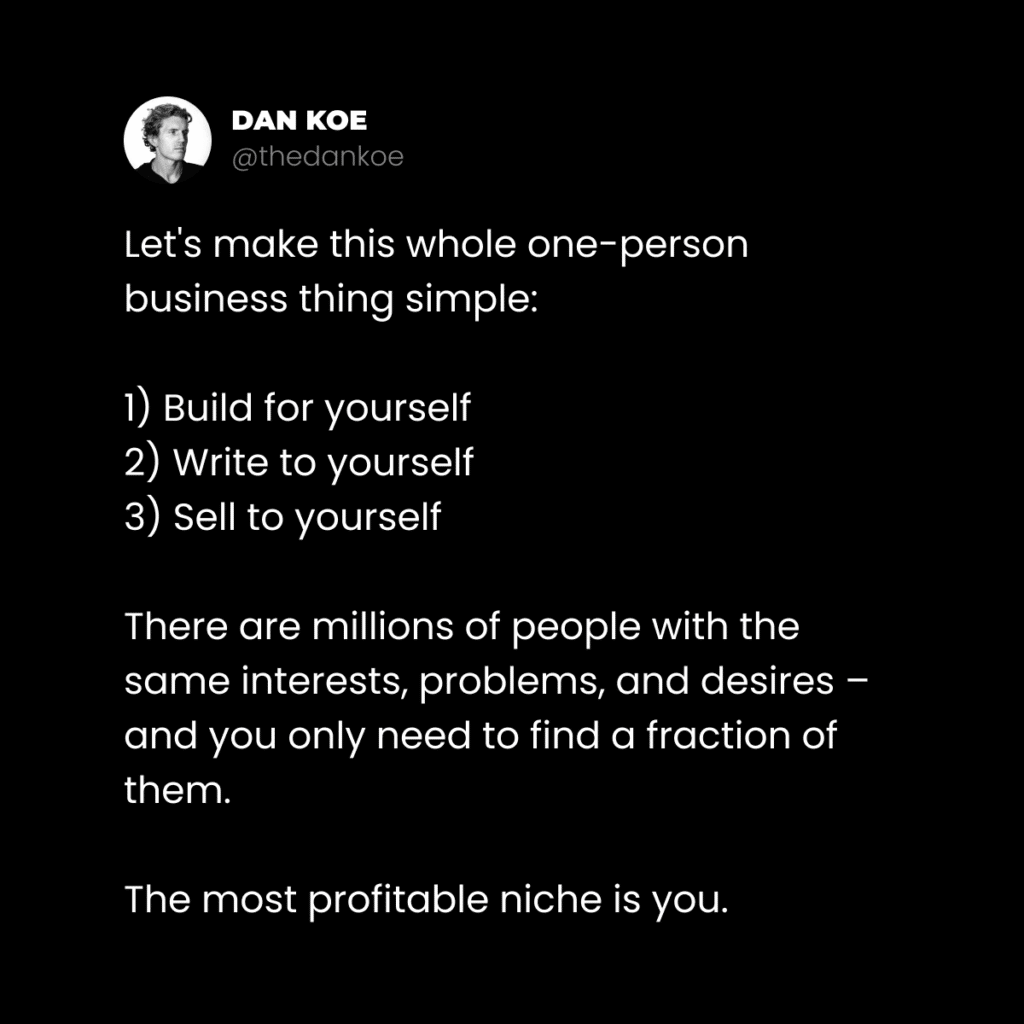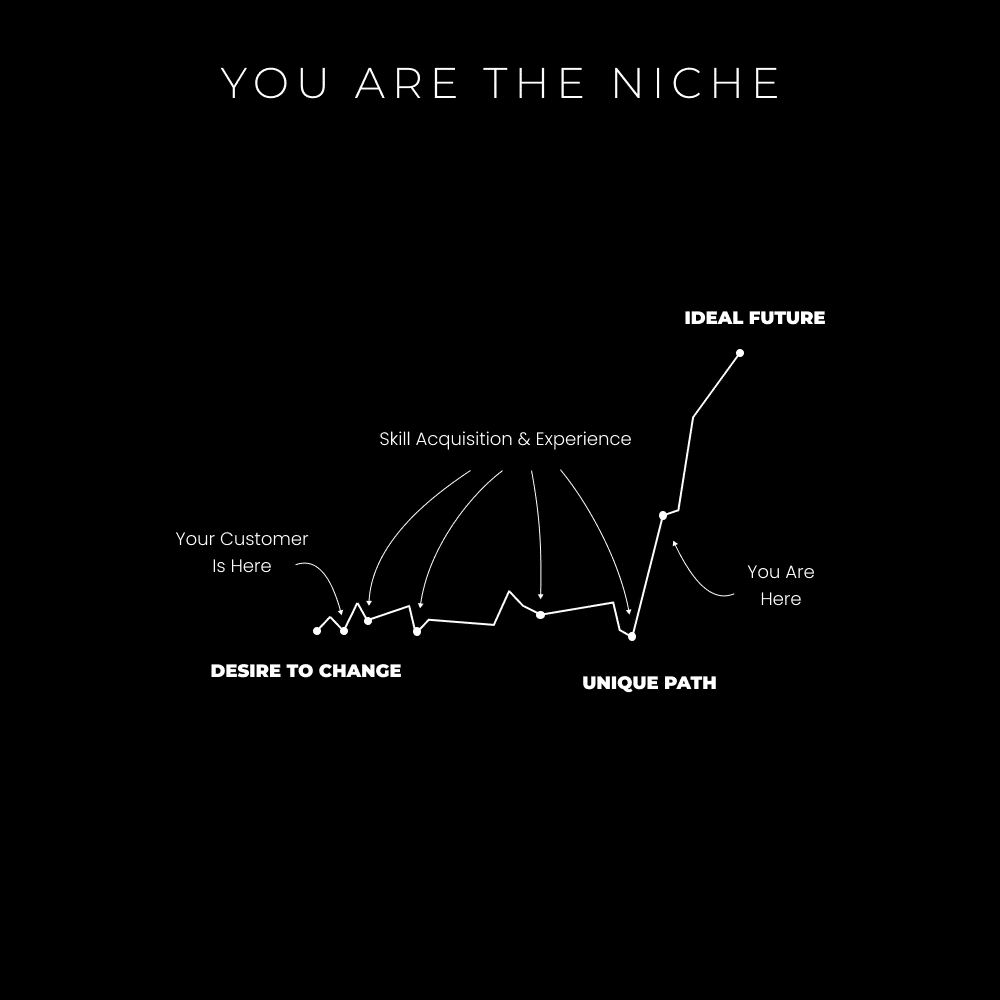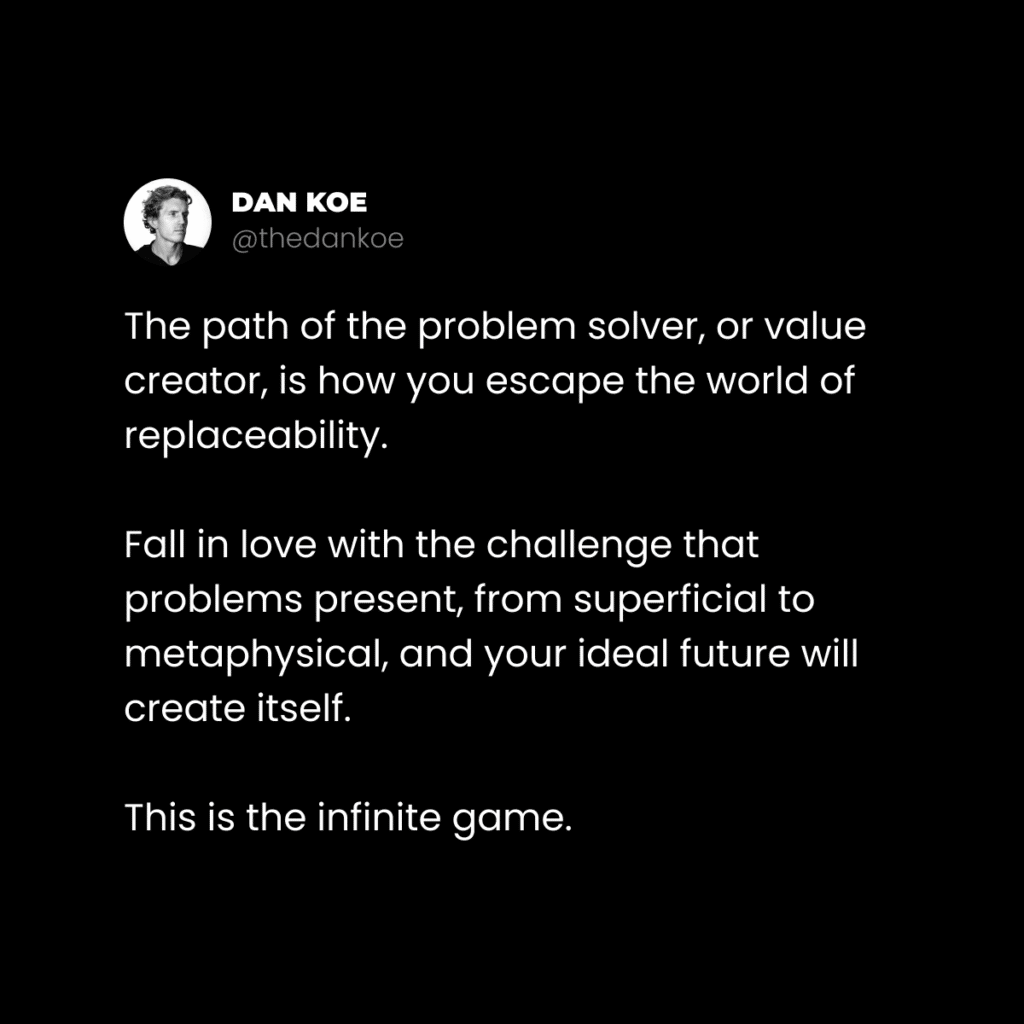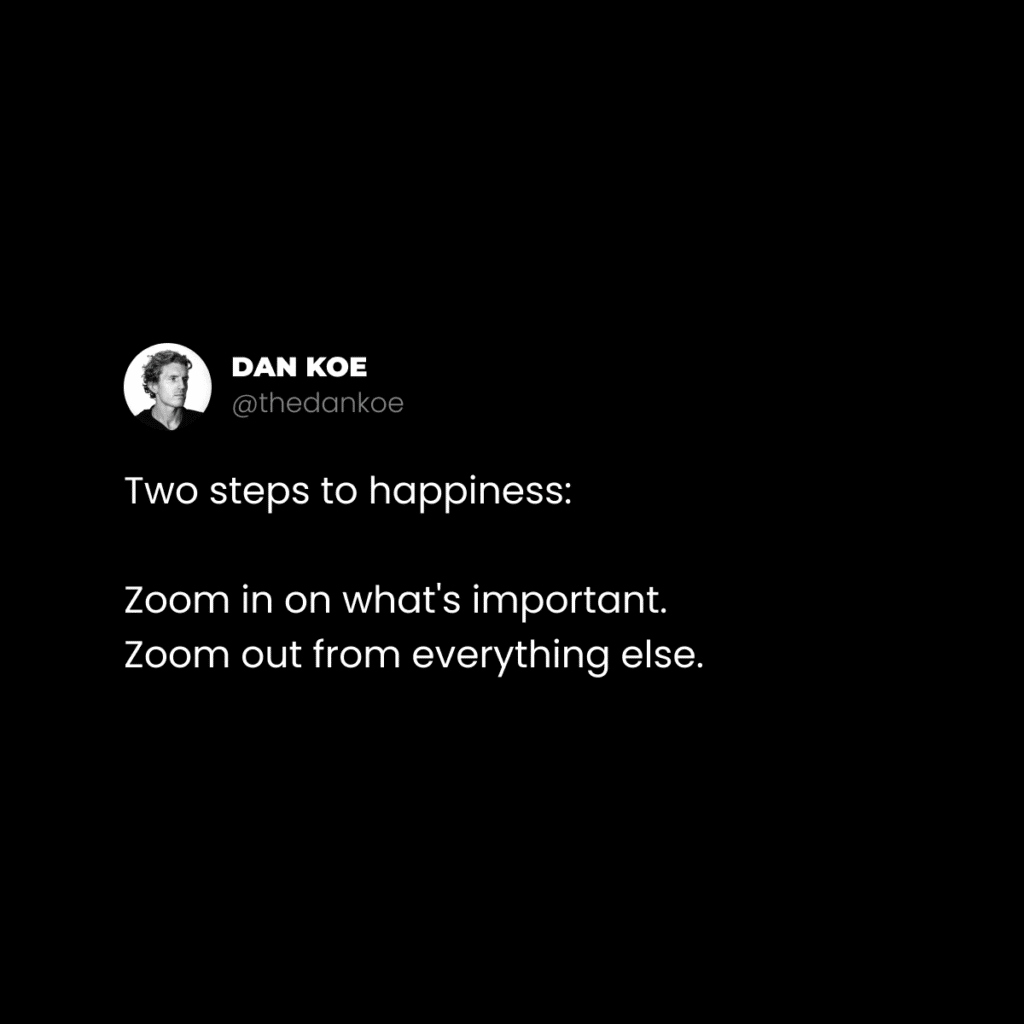The first business course I bought was a 6 figure agency course.
This was 6 years ago.
Before that, I didn’t see the value in courses.
I tried doing everything myself.
I knew the information was online, and it was, but it never worked.
There were too many missing pieces.
Free education on social media is great, but the algorithm encourages people to keep it short, sweet, and focused on the most interesting topics.
Everyone wants free free free and that’s what causes the problem of high value advice getting buried under a sea of noise.
Don’t act like you are immune to this. Nobody is.
When I was fed up with my multiple business attempts, I was ready to invest my entire bank account.
I researched the best business models, found a dude who had a good reputation, watched his webinar, and paid $999.
This was a huge chunk out of my finances.
It all went onto my first credit card.
And, as a college student working part-time, it put a lot of stress on me.
I was juggling so many things at once.
Schooling that I didn’t care about… but it pushed back my deadline to make my business work before getting a job.
A part-time job that was clearly a dead end.
Multiple business failures before this.
There was a lot on the line.
And, to cut to the chase, it didn’t work out.
The course was great, and taught me about the applicability of copywriting, funnels, sales, and the client acquisition process that went on to fuel my future businesses…
But, there were three things that destroyed my chances at success:
- I didn’t give a flying f*ck about running a Facebook ads agency. I didn’t want to work on my business.
- Cold emailing local businesses was time-consuming, stressful, and none of them had the money to pay me.
- I was never confident in my niche, and that led to an immense amount of friction and shiny object syndrome.
This Facebook ads journey of mine taught me more than any other business, course, or opinion out there.
And, even if it didn’t teach me a direct lesson, it identified a problem in all future businesses I would start.
Choosing a niche.
Before we dive in, this is a planned post (but I still plan to give as much value as possible here).
The first Solopreneur Sprint starts February 7th. The first thing we go over is exactly how to create a niche you are confident in, one that resembles you. Consider checking it out.
It’s a $150 cohort with an interesting, but impactful, structure (so I don’t have to charge thousands for the same material).
The Most Profitable Niche Is You

The ad agency wasn’t my first, or last, business attempt.
Other people had made the freelancing model work, and I wasn’t giving up just yet (even though I “gave up” multiple times before).
After grinding my way to my first 6 figures, I stumbled across Twitter.
I found accounts in a little community called “Money Twitter” and they introduced me to a path that would lead to where I am now.
It didn’t all happen at once, but I had a vision for the future of my brand.
I wrote content, built a product, and focused on solving the problems that stood in the way of my ideal future.
But, one thing made me stand out from everyone else in the business scene:
I didn’t have a static niche.
My newly repositioned offer was marketing consulting for creators (it only made sense to get out of the local business niche), but I didn’t only talk about marketing.
I talked about whatever I wanted, in a way that illustrated the topic’s importance to a broad audience.
If I wanted to talk about emotional management, I would.
If I wanted to talk about fitness and nutrition, I would.
If I wanted to post an aspirational piece of advice, I would.
80% of my content did not revolve around my service, and it didn’t matter.
Why would it?
If I can be interested in both business and fitness, other people can too.
And, if you’re “supposed” to narrow down your niche, is this not the best way to do it?
Just target the people that are like you, or want to become like you since they have a similar ideal future.
It’s not like you promote your products or services in all of your content.
And, you can create a system that bakes authoritative and promotional content in.
If I want to launch a new product or service, here is what I would do:
- Talk about whatever I want, in an interesting way that leads to growth.
- Craft a 3-week long strategy based on the topics in the product or service (this builds authority, and, it’s what I’m doing right now with Solopreneur Sprints… pay attention – did I talk about business in the last letter?).
- Start beginner level for the sake of customer awareness and increase to advanced as it gets closer to launch.
- Write long, medium, and short-form content from the top down. The promotions write themselves.
- Systemize what worked and incorporate promotions throughout the week to keep sales high. Like bi-weekly threads on a topic around your offer.
There is a naunced separation between your brand and your product. Your brand is not your product.
A few “off-topic” pieces of content aren’t going to ruin your income. They actually help it if you know what you are doing.
I was fortunate to have my money problems solved by the time I started as a creator.
Most people start for the sake of money, which is good, but the need for survival can screw with your creative thinking.
Most creators start by subscribing to one business ideology telling them to niche down as far as possible, target a person they have nothing in common with, and use a skill that they don’t care about to get results. It’s no wonder people quit so soon.
If you want to remove all competition, you have to think bigger.
A personal brand can be a means to landing clients.
But, when you treat your message as your life’s work, it is impossible to encapsulate everything in one traditional niche.
Your big goals in life will take multiple skills, interests, and expertise. Like how spirituality can help with financial freedom or emotional management in business. Your interests are what make your brand unique.
How To Create Your Niche Of One

From a spiritual lens, your “brand” or “self” can be the outcome of repetitive business ideology or a conscious personal creation.
If your brand remains static, you’re in for a world of pain. Instead, we want to evolve, and never stop.
Because if you don’t evolve, you get trapped in a lower stage of creator development.
Let’s walk through how to recreate yourself (for the sake of business).
1) Map Your Ideal Future
How is your story going to end?
Will it result in peace, health, and fulfilling work? Or do you have no idea?
Your story is what sets your personal brand apart.
If you don’t have a vision for your future, how are you going to self-educate and execute in a conducive direction?
Sit with this and think.
We will come back to it in step 3.
2) Intelligent Imitation
When you take stuff from one writer it’s plagiarism, but when you take from many writers it’s called research. – Wilson Mizner
My voice is a combination of the voices I love.
My brand design is a combination of the colors, feel, and style I’ve grown to like over time.
My products, website, and landing pages were made by taking the best from everyone else.
A color here, button there, tone shift there, and other minor distinctions.
I’m not talking about a few big things that make you look like a copy cat. I’m talking about every single minor distinction. This compounds with time.
You do things “your own way” by taking the best from the people you aspire to be like and making it your own.
This works for any project, but here’s what you do:
- Write down the books that impacted you the most
- Write down the creators, authors, or public figures who’s style you love the most
- Immerse yourself in their work to condition your mind to think in that style
- Write down their tone, voice, and what makes them great
- Research their products, landing pages, and every detail about how they make an income
In short, create a tribe of mentors and exclusively consume their content for an extended period of time.
Become their best friends (in spirit).
Then, transfer your passion for what you do through spirit.
You won’t have to copy them if your subconscious mind pieces together their ideas into an original one.
You are a perspective vessel, and that is what makes you unique.
If you make it a habit to study every aspect of those you aspire to be like, good ideas will become automatic.
Then, execute on those ideas from your perspective.
Perspectives are goal oriented.
So, create from the perspective of trying to actualize your ideal future.
Some people write in their journal because their goal is mental clarity.
Some people write online because their goal is financial freedom.
What is your goal? And how do particular skills and interests help you get there?
3) Book To Brand Content

Every story has an ideal outcome, an end goal.
The path to this end goal is going to be filled with highs, lows, emotions, battles, mistakes, and solutions to be systemized.
Here’s how you turn your “self,” or brand into a niche that houses your content, products, and services:
- Treat your ideal future as the end goal of the story.
- Make note of your past, there are a select few pivotal moments that can be your starting point of the book.
- Write down an outline of the book. What are the chapters that must be included to reach the end goal?
- Outline key points for each of those chapters.
This won’t be immediate, but you need an outline.
Ideas for chapters will come to you as you experience life and make progress.
You won’t know what to write for some chapters, and that’s the point.
You will have to acquire skills, interests, and expertise to actualize your reality.
You are the leader that attracts followers.
Pursue your goals, solve the problems standing in the way, and pass down your lessons.
4) Write Your Story
The story makes the brand, and yours is unique.
Your story makes you relatable to those going through the same low points as you.
It gives people hope that there is a way out, and that you are the lighthouse to guide them.
Now that you have an outline for the story of your life, start writing it.
- Write the sections of each chapter as an article or newsletter.
- Repurpose that writing into a podcast or YouTube video.
- Condense the main points into a thread, carousel or LinkedIn post.
- Rewrite those main points as engaging tweets.
- Turn those tweets into reels and posts for other platforms.
This process gives you a multi-dimensional understanding of the topic you are speaking about.
And, if you remember the best ways to learn, teaching is one of them.
You will hate your first pieces of content, but that is how you identify a problem to solve.
If you struggle to write, that is a good thing.
5) When In Doubt, Zoom Out

The solution to struggle is perspective.
This journey is difficult.
You will struggle to articulate your niche, because nobody wants to put themselves in a box.
Understand that you don’t need to solve this problem immediately.
Instead, you need to set an intention to solve the problem.
From there, you educate yourself with courses, content, and conversations that will store creative firepower in your brain.
Overload your mind with potential solutions.
Just don’t get distracted.
Next, zoom out.
Give your mind some breathing room to craft a creative solution to that problem.
Go on a walk. Go out with friends. Hit the gym.
Do anything that allows you to stop thinking about work.
Like magic, the “aha!” moment will come.
Your subconscious mind will send the breakthrough idea to your conscious mind.
This cyclical process is called sovereign living.
The highs and lows of life are not masked over by the routine of a job.
Keep that in mind, and enjoy the rest of your day.
– Dan Koe
P.S. The first Solopreneur Sprint starts on February 7th.
This is an intensive 14-day strategy for overwhelmed creators:
- Build the base of your one person business
- Create and gain confidence in your niche of one
- Write 20+ foundational content pieces (that you can repurpose 1000 different ways)
- Learn zero-cost strategies to getting eyes on your content and profile (for followers)
- Repurpose your best content and leverage them to grow even faster
Without the high prices of the normal cohort model.
If you’re interested, enroll here.
The price is $150 (for a brand that you will leverage for life).



